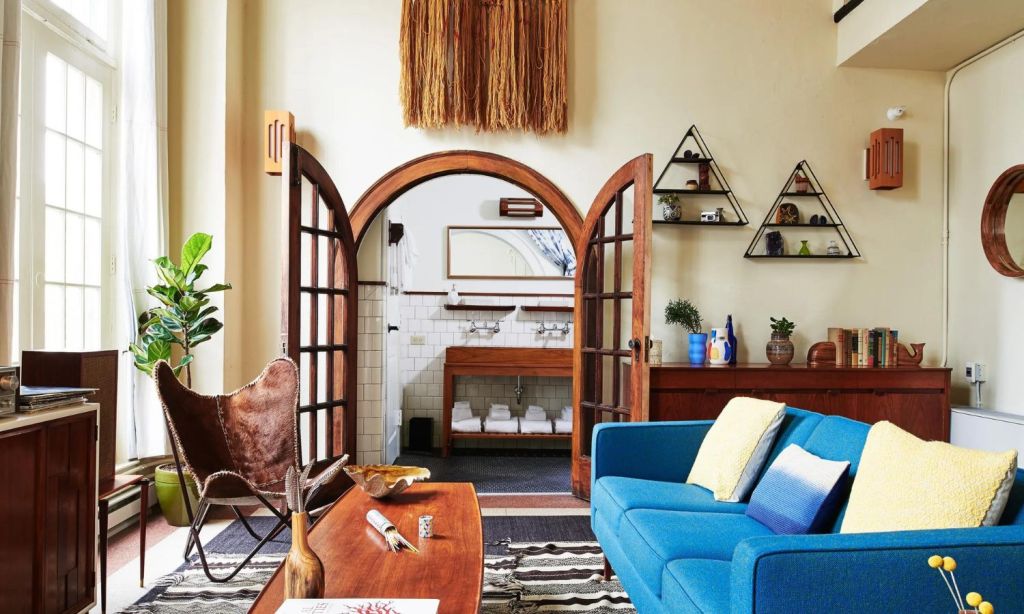A cinema room, co-working space and bike rental are just a few of the amenities Steel House in the centre of Copenhagen offers. It’s not a hotel — it’s a hostel, part of a trend I’ve noticed of hostels stepping up their game, bridging the gap between hotels and earning themselves the name ‘poshtels’.
“Hostels are all fancy now with good design and killer cocktail programs,” wrote Mark Ellwood in Conde Nast Traveler in 2018. Back then luxury hostels included those in the Generator and Freehand group and Clink in London and Amsterdam.
Since then more luxury hostels have opened and the demand is there. Google searches for ‘poshtel’ peaked in Australia in April this year. Draper Startup House, a collection of hostels for professionals, opened a branch in Hyderabad, India late last year. Generator Berlin Alexanderplatz opened in June 2024 and Paramount Hotel by Generator in New York’s Times Square will open this September.
In June 2024, accommodation brand Leisure Accommodation Collective (LA Co) launched Drifter Christchurch, its first of five hostels in Australia and New Zealand. It features a social lounge and courtyard with a fire pit, a wellness studio with a mindfulness lounge and a 150-seat bar called The Rambler — all housed in a heritage building.
“The historical significance of the building and its location is something we really leaned into with our design approach,” Sam Griffin, creative director of CTRL Space, the Auckland-based designers behind Drifter Christchurch, told The Hotel Conversation.
“When it was built in 1919, it was considered a progressive, modern piece of architecture so naturally we looked to modernism as a design style to reference and specifically the Bauhaus movement of the 1940s for certain elements including the colour palette.”
What many people get wrong about hostels — apart from underestimating the quality of accommodation some now offer — is that they think they’re all shared rooms with bunk beds when many also offer single or double occupancy rooms. Many also assume hostels are only for budget-conscious travellers when their social aspect is also a strong drawcard — even for friends, couples and families.
“Generator makes an intriguing case that there’s an opportunity to target well-off millennial travellers looking for distinctive places to stay in cities where budget hotels with buzzy bars are scarce,” journalist Sean O’Neill puts it in Skift.
A tourist in Europe, Oliver Jakes, spoke to National Geographic about his experience at Bogentrakt, an independent hostel in Chur, Switzerland that opened in 2023, occupying a former prison in the town’s historic centre.
“It’s a beautiful hostel and there was a whole mix of characters there — a young family, a film crew, backpackers from Finland,” Jakes says. “[…] the owner cooked up this classically Swiss dish called capuns. Nobody paid for this. It’s the type of experience you’d have had 20 years ago in a hostel — drinking and eating together and just talking.”
Michelle Szpak Gram, general manager at Steel House, says when there are big concerts and sports events in Copenhagen, many groups of friends will stay, booking single, double or bunk bed rooms. Young couples also often book double rooms.
“You choose to stay in a hostel over a hotel or Airbnb because you want the social experience,” Szpak Gram says. “Many hostels are modern, clean and can be more up-to-date than hotels. With more flights internally in Europe, travelling has never been accessible and that means the need for accommodation has increased in most cities.”
Szpak Gram thinks more classic hotel chains will soon move into the hostel market. Hotel brands will open their eyes to how profitable running a hostel is — far more profitable than running a hotel, she says.
“Personally I think it will be a shame if mega hostels completely dominate as it will kill all the smaller hostels running with heart and passion,” she says.
I see big hotel brands tapping into the hostel industry and hostel groups like Generator, Freehand and Drifter only helping independent luxury hostels as they work to change long-established misconceptions guest by guest and with their marketing. Drifter calls itself a combination of stay, food and drink, wellness and experiential travel.
The brand will open soon in Byron, Auckland and Wellington. Its co-founder Hugh Stephenson told The Hotel Conversation the Christchurch branch was the realisation of a dream 10 years in the making.
“[…] to throw out the rule book on mass-produced accommodation and bring a brand to market that is authentically and purely designed for travellers of all walks of life,” he said.
Related: Unpacking the Uptick in Upcycled Hotels
Related: What I Wish I Knew About Queenstown Before Visiting
Read more stories from The Latch and subscribe to our email newsletter.

